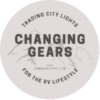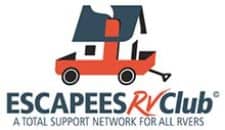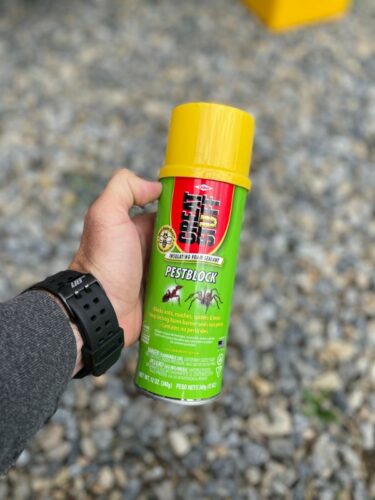Thanks for “checking out” the Changing Gears family checklists, budgets and forms! Our online RV checklists are provided to you free of charge.
Other Changing Gears Checklists
- RV PDI Inspection Checklist
- Arrival & Setup Checklist – Motorhome
- Arrival & Setup Checklist – Towables
- Departure Checklist – Motorhome
- Departure Checklist – Towables
- RV Must-Have Accessories List
- New to RVing? – Getting Started
- Road Test Checklist – Motorhome
- Road Test Checklist – Towables
- RV Camping Gear List
- RV Types Pros & Cons Chart
- RV Basic Lifestyle Budget
All checklists are provided as-is. Use at your own risk. No merchantability for any use express or implied. See Website Terms & Conditions.
Download This Checklist!
Class A Motorhome
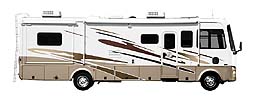
PROS
- Easy to drive on major highways and Interstates.
- Spacious, open floor plans suitable for large families and full-timers.
- Elevated driver position provides a good view of the road ahead.
- Driving and living compartments are connected. No need to get out of the RV during stops. Living area accessible even while moving.
- Most cargo storage space of all RV types.
- Self-contained facilities (propane, water) make for easy dry camping.
- Does not need to be deployed to be used or accessed.
- Can tow vehicle behind or support a carrying platform on hitch receiver.
- Residential-style layout and furnishings.
CONS
- Most expensive of all RV types.
- The RV Consumer Group rates Class A’s as having more structural problems and safety issues in crashes.
- Larger models can be difficult to maneuver in tight spaces.
- Driving compartment being part of the living space does not appeal to some people, feeling like they are always in a vehicle.
- Most are too large to drive around town; alternate local transportation required.
- Elevated driver position and width of the vehicle make it difficult to judge clearance on the right side.
- Top clearance can be a problem under low branches and structures.
- Problem compounded if carrying items on roof, such as canoes.
- Requires large storage area when not in use.
- Poor fuel efficiency. Figure 6-10 mpg for gas models, 8-14 mpg for diesel.
Class B Motorhome
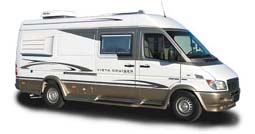
PROS
- Least expensive motorized RV to own and operate.
- Quite fuel efficient! Average 10-15 mpg, with some models achieving up to 25 mpg!
- Easy to drive on highway and around town. This RV is constructed from a van, so it is just as easy to drive.
- Driving and living compartments are connected. No need to get out of the RV during stops. Living area accessible even while moving.
- It can be used as local transportation.
- Can tow a small trailer or support a carrying platform on hitch receiver.
- Can be used as a second family car when not traveling.
- Requires no special storage when not in use. Fits in standard driveway and lower models may fit in the garage.
- Can reach less accessible camping sites that are too tight for large RV’s.
CONS
- Limited space, practical only for short trips.
- Accommodates a small number of travelers.
- Very little visual or acoustic privacy.
- Expensive purchase price; the most expensive per square foot of any RV.
- Few full-sized appliances. Expect smaller refrigerators, microwaves, ranges, etc.
- Cannot tow a second “toad” vehicle. You have to pack up camp any time you want to drive away!
Class C Motorhome
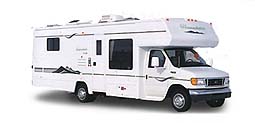
PROS
- Easy to drive on major highways and Interstates.
- Spacious, open floor plans suitable for medium-size families and seasonal travelers.
- Elevated driver position provides a good view of the road ahead.
- Driving and living compartments are connected. No need to get out of the RV during stops. Living area accessible even while moving.
- A fair amount of cargo storage and lots of room for adventure gear and equipment.
- Self-contained facilities (propane, water) make for easy dry camping.
- Does not need to be deployed to be used or accessed (with the exception of slide-outs).
- Better crash-worthiness compared to a Class A.
- The “Goldilocks” choice – can do just about everything!
CONS
- Huge range of quality; some Class C’s aren’t worth buying!
- Most Class C’s have limited payload. It’s easy to overload them! (Super C’s are an exception).
- Larger models can be difficult to maneuver in tight spaces.
- Driving compartment being part of the living space does not appeal to some people, feeling like they are always in a vehicle.
- Despite what the manufactures may say, most cannot reasonably tow a second vehicle. You will likely need a large diesel-powered Class C or Super C if you want a “toad.”
- Top clearance can be a problem under low branches and structures. Problem compounded if carrying items on roof, such as kayaks.
- Requires large storage area when not in use.
- Poor fuel efficiency. Figure 8-12 mpg for gas models, 10-16 mpg for diesel.
5th Wheel Trailer
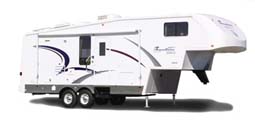
PROS
- Easier and safer to tow than travel trailers, but requires more caution and skill than motor homes.
- Easier to back up than travel trailers.
- Spacious, open floor plans suitable for fulltimers.
- Provides more interior space per length foot than motor homes because it does not contain driving and engine compartments.
- Most storage space of all trailer type RV’s.
- Tow vehicle doubles as local transportation.
CONS
- Requires a truck with fifth wheel hitch in bed.
- Large trailers require large tow vehicles!.
- Driving and living compartments are separate. Living area inaccessible while moving.
- Generally cannot tow vehicle behind trailer.
- Larger models can be difficult to maneuver in tight spaces
- On tall models top clearance can be a problem under low branches and structures. Problem compounded if carrying items on roof such as canoes.
- Most models require large storage area when not in use.
Travel Trailer
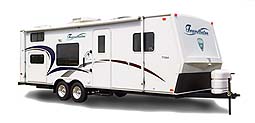
PROS
- Spacious, open floor plans suitable for a variety of uses, including snowbirding.
- Provides more interior space per length foot than motor homes because it does not contain driving and engine compartments.
- Tow vehicle doubles as local transportation.
- Lower profile allows easier entry than a fifth wheel trailer.
- Lower profile allows roof storage of items such as canoes, with less concern for top clearance.
- Can be towed with a variety of vehicles fitted with a standard ball hitch and rated for the trailer weight.
CONS
- Least stable on the road of all RV types. Requires the most skill to tow and back up.
- Large trailers require large trucks.
- Less storage than fifth wheel trailers because it lacks a raised section.
- Driving and living compartments are separate. Living area inaccessible while moving.
- Generally cannot tow vehicle behind trailer.
- Larger models can be difficult to maneuver in tight spaces.
- Larger models require large storage area when not in use.
Toy Hauler
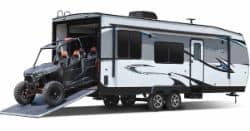
PROS
- Easy to haul ATVs, golf carts, dirt bikes, skis, snowboards, and all other adventure gear!
- Lots of headroom, sometimes wide-body.
- Spacious, open floor plans suitable for full-time RVers and snowbirds.
- When designed as a fifth wheel, it provides more interior space per length foot than motor homes because it does not contain driving and engine compartments.
- Tow vehicle doubles as local transportation.
CONS
- Heavy! Due to heavy-duty construction.
- Large trailers require large tow vehicles!
- Park carefully to access your gear from the rear.
- Extra height reduces fuel efficiency.
- Driving and living compartments are separate. Living area inaccessible while moving.
- Generally cannot tow vehicle behind trailer.
- Larger models can be difficult to maneuver in tight spaces.
- On tall models, top clearance can be a problem under low branches and structures.
Most models require large storage area when not in use.
Truck Camper
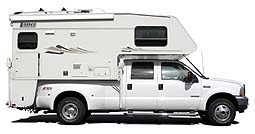
PROS
- One of the least expensive RV’s.
- Mounts in the bed of most full size trucks with minimal modifications.
- Easy to drive on highway and around town. This RV is attached to the bed of a truck, so it is just as easy to drive.
- Truck doubles as local transportation.
- Can tow a small trailer or support a carrying platform on hitch.
- Truck can be used as a family or work vehicle when not traveling.
- Requires no special storage when not in use. Fits in standard driveway or back yard.
- Can reach less accessible camping sites that are too tight for large RV’s. When attached to an off-road truck, it can reach camping sites that no other RV’s can.
CONS
- Road handling can be an issue when mounted on a truck with light suspension.
- Limited space practical only for short trips.
- Driving and living compartments are separate. Living area inaccessible while moving.
Expandable Camper
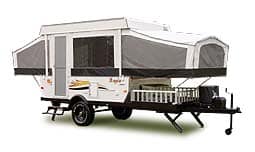
PROS
- One of the least expensive RV’s.
- Very light weight. Can be towed behind light vehicles such as small trucks, SUV’s, vans, and large sedans.
- Tow vehicle doubles as local transportation.
- No concern for top clearance because trailer folds lower than the tow vehicle.
- Requires no special storage when not in use. Fits in standard driveway or back yard.
- Can reach less accessible camping sites that are too tight for large RV’s.
CONS
- Limited space practical only for very short trips.
- Living area is closed up during transportation and is inaccessible even during rest stops.
- Non-existent or limited insulation makes this type uncomfortable in cold weather.
Teardrop Trailer

PROS
- Can be towed by almost any vehicle! Weigh ranges from 600 to 2,000 lbs.
- Low-profile has minimal impact on fuel efficiency.
- Tow vehicle doubles as local transportation.
- Lower profile allows easier entry than any other camper.
- Can normally be stored in a garage or under a carport.
- Lower profile allows roof storage of items such as canoes, with less concern for top clearance.
- Can be towed with a variety of vehicles fitted with a standard ball hitch and rated for the trailer weight.
CONS
- Usually, no bathroom. Only the largest teardrops have a bathroom or shower facilities.
- Smallest of all the RV and camper types. Not a great space for a rainy day!
- Limited to tents and awnings for living area expansion. No slide-outs.
- Less storage than other types of campers.
- Kitchen and living compartments are separate. No luck if you’ve got the munchies!
Fiberglass RV
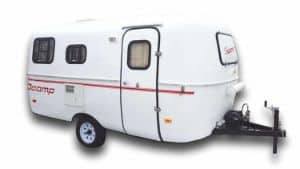
PROS
- Lightweight!
- Easy to clean, inside and out.
- Holds their resale value.
- Waterproof, seamless exterior.
- Aerodynamic, good for fuel efficiency.
- Tow vehicle doubles as local transportation.
- Lower profile allows easier entry than any other camper.
- Can normally be stored in a garage or under a carport.
CONS
- Limited interior lounge and storage space
- Small refrigerators, cramped bathrooms
- Limited to tents and awnings for living area expansion. No slide-outs.
- Less storage than other types of campers.
- You gotta keep the inside clean – people always want to look inside!
Expedition Trailer

PROS
- Carry all your gear out of your tow vehicle!
- Set up base camp in a matter of minutes.
- Typically, very high construction quality.
- Trailer protects gear from animals, high water, theft and the elements.
- Will likely with a custom a builder to develop your dream.
- Great pick for vehicles that can’t tow heavy campers.
- Easy titling and registration.
- Most badass camper within 50 miles.
CONS
- Can become extremely expensive!
- No living or sleeping space.
- Great for boondocking, not developed campgrounds.
- Limited showering and bathroom facilities.
- Resale value depends on finding the right buyer.
Andy Herrick is a blogging nerd, #8 Enneagram, wannabe bread baker, INTJ, RV industry professional, and small business entrepreneur. He can be found hanging out with his lovely wife and family, skiing, cycling, climbing, hiking, and convincing anyone who will listen why dogs aren’t really that great of pets. Also, he runs this website.
